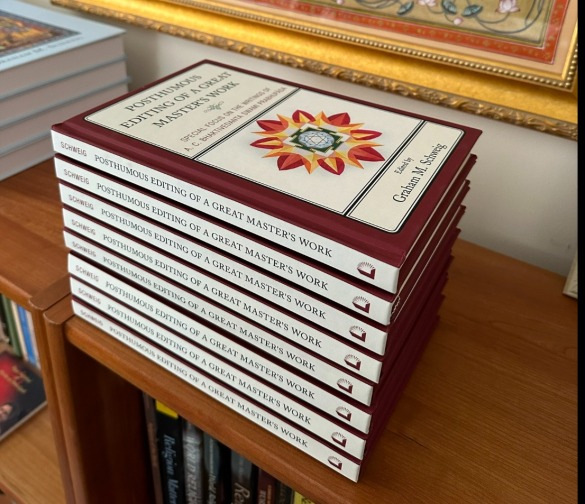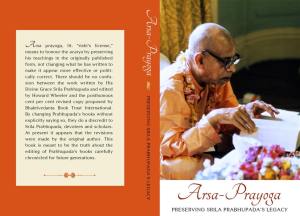 The Universal Form
The Universal Form
Bhakta Torben Nielsen recently made me aware of this change to Bg. 11.28:
Original and authorized 1972-edition:
“As the rivers flow into the sea, so all these great warriors enter Your blazing mouths and perish.”
BBT International’s edited 1983 edition:
“As the many waves of the rivers flow into the ocean, so do all these great warriors enter blazing into Your mouths.”
So-called original manuscript:
There is no verse for 11.28 as the page is missing. But verse 30 mentions the words “blazing mouths”.
This is a very interesting change, because it is of a grammatical nature:
- In Srila Prabhupada’s original 1972 edition the adjective “blazing” describes the plural noun “mouths”.
- In BBT International’s 1983 edition the adjective “blazing” describes the plural noun “warriors”.
So which translation is grammatically correct – Srila Prabhupada’s or Jayadvaita Swami’s?
The context
Here we have the verses from Bg. 11.28-30 (original edition):
“As the rivers flow into the sea, so all these great warriors enter Your blazing mouths and perish.” (Bg. 11.28)
“I see all people rushing with full speed into Your mouths as moths dash into a blazing fire.” (Bg. 11.29)
“O Visnu, I see You devouring all people in Your flaming mouths and covering the universe with Your immeasurable rays. Scorching the worlds, You are manifest.” (Bg. 11.30)
We see that Srila Prabhupada describes the mouths of the universal form as “blazing” (Bg. 11.28) and “flaming” (Bg. 11.30), and compares them to a “blazing fire” (Bg. 11.29). There is no “original manuscript” available for Bg. 11.28-29, but the “original manuscript” for Bg. 11.30 also says “blazing mouths”, as mentioned above.

Plate 31
The painting above this article is Plate 31 from the Bhagavad-gita As It Is. Just like all other paintings in the book it was approved by Srila Prabhupada. On the painting we clearly see that the warriors are entering into the blazing mouths of The Universal Form – just like we are told that they are in the Bg. 11.28, 1972 edition.
Srila Prabhupada’s desire
Based on the above, there is no doubt at all that Srila Prabhupada wanted to use the adjective “blazing” to describe the mouths of the universal form. He never meant to say that the great warriors were “blazing”.
What does the previous acaryas say about Bg. 11.28? (as translated on bhagavad-gita.org)
Sridhara Swami’s commentary:
“As unlimited currents of water helplessly flow in innumerable rivers and are propelled from multiple channels into the ocean, the mighty warriors of the Kaurava and Pandava armies are seen to be helplessly propelled into the flaming, gnashing mouths of the visvarupa or divine universal form of Lord Krishna.” ()
Kesava Kasmiri’s commentary:
“How helplessly do the mighty warriors of the Kaurava and Pandava armies enter into the flaming mouths of Lord Krishna’s visvarupa or divine universal form? As helplessly as unlimited currents of water from innumerable rivers are propelled into entering the ocean.”
In his translations of Visvanath Cakravarti Thakura and Baladeva Vidyabhusana’s Bhagavad-gita commentaries Bhanu Swami also translates Bg. 11.28 as follows:
“As many swift currents of rivers flow towards the sea, so these heroes of the world enter Your flaming mouths.”
The sanskrit
Gaura Krishna Dasa, a student of sanskrit, sent me the following analysis of the sanskrit grammar:
Regarding the change in the translation of Bhagavad gita 11.28.
The word “abhivijvalanti” is in the 1972 edition taken as what in grammar is called a verbal adjective or a participle. A participle is basically a derivative from a verb but belonging in the group of adjectives. This particular participle is a participle in present tense, active voice for parasmaipada verbs. It is in neuter gender, plural number and in the accusative case which clearly indicates that it relates to “vaktraani” which is also in neuter gender, plural number and accusative case.
Sridhara Swami, Visvanath Cakravati Thakur and Baladeva Vidyabhusana have the same grammatical conclusion of this word as a participle and therefore in relation to “vaktraani” attributively, “blazing mouths”.
The “anti” ending in “abhivijvalanti” could preliminarily appear as a finite verb 3rd person in the plural number and present tense related to “nara-loka-viira” (the kings of human society), but this conclusion is in the least very strange. It would, if accepted, be a distortion of historical facts and it must be concluded faulty because this sentense already has a finite verb namely “visanti” meaning entering. So if we for the sake of example maintain “abhivijvalanti” as a finite verb, as it is done in the 1983 edition it would translate “as the many waves of the rivers flow into the ocean, so all these great warriors enter and blaze your mouth”, since “abhivijvalanti” can also not be taken as an adverb describing “visanti” attributively.
Conclusion:
“abhivijvalanti” must be taken as a participle – as done by the previous acaryas and the original 1972 edition – and not a verb as done in the 1983 edition.
Conclusion
The evidence against Jayadvaita Swami’s change is overwhelming:
1. Srila Prabhupada is very clear in his original Gita and his manuscripts – the mouths are blazing. Not the warriors.
2. Srila Prabhupada follows the previous acaryas who says that the mouths are blazing (flaming, gnashing).
3 The painting depicting this event (Plate 31 in the Bhagavad-gita As It Is) shows that it is the mouths of The Universal Form that are blazing.
4. According to sanskrit grammer it is the “mouths” that are “blazing”. Not the “warriors”.
Even if both translations could be correct (which they cannot), there would still be no justification – based on the above analysis – to change Srila Prabhupada’s translation of the verse.
It would not be possible to do this without overriding his own editorial decisions and thus violating the arsa-prayoga principle.
—
Please see additional evidence here.










You must be logged in to post a comment.